- Home
- Colson Whitehead
Sag Harbor Page 4
Sag Harbor Read online
Page 4
When we got to the shortcut in question, there was nothing to say beyond Reggie's verdict: “That's messed up.” We were used to emerging from the woods to see a car in the driveway of a shortcut house and having to hightail it back. We were not accustomed to the woods disappearing. The old oaks and chestnut trees and low-lying sticker bushes had been uprooted and cleared. In their stead, moist orange dirt was heaped in piles, and the freshly laid cement foundation gaped at us. It was messed up, some newcomers taking over land we had claimed. It wasn't hard to picture the future. First this lot, then the rest. One by one, the new Sag Harbor would replace the haunted houses in all their forms.
“I hate that,” I said.
“That's messed up,” Reggie repeated.
We took the long way around. Not a lot of people in the Hills, either. Clive's house looked dead. The brown kente-cloth drapes behind the sliding glass doors to his living room were tight. Usually, they were open from May to September, inviting us in. The grass had been cut, though, so this was a promising sign. Maybe next weekend.
“I think we're the only ones here,” I said. Private schools were done for the year, but not public schools yet, and I didn't know about the Catholic schools. Maybe it was just us.
“Ma-a-nn,” Reggie said.
Then we heard a far-off call. We listened and nodded to each other. One two three. Pause. One two. Pause. It was the metallic squeal of a basketball on asphalt, the teenage Morse code of indolent boys that said: I AM OVER HERE. We followed the trail.
We saw NP bouncing about in his familiar rhythm. To observe NP was to witness a haphazard choreography of joints and limbs. His invisible puppeteer had shaky hands, making it seem that NP was always on the verge of busting out into some freaky dance move. Looking back, his condition was probably caused by him trying to keep his freaky dance moves in check, whatever convulsive thing he'd taken notes on at a party the week before and had just finished practicing in his room. That I wouldn't have heard of the dance was a given—the Phillie Bugaloo, the Reverse Cabbage Patch. Hanging out with NP was to start catching up on nine months of black slang and other sundry soulful artifacts I'd missed out on in my “predominately white” private school. Most of the year it was like I'd been blindfolded and thrown down a well, frankly.
Not that I didn't learn anything in school, culture-wise. The hallways between classes were tutelage into the wide range of diversions our country's white youth had come up with to occupy themselves. When I had free time in between engineering my next humiliation, I was introduced to the hacky sack, which was a sort of miniature leather beanbag that compelled white kids to juggle with their feet. It was a wholesome communal activity, I saw, as they lobbed the object among one another, cheering themselves on, and it appeared to foster teamwork and goodwill among its adherents. Bravo! There was also a kind of magical rod called a lacrosse stick. It directed the more outgoing and athletic specimens of my school to stalk the carpeted floors and obsessively wring their hands around it, as if to call forth popularity or a higher degree of social acceptance by diligent application of friction. You heard them muttering “hut hut hut” in masturbatory fervor as they approached. Good stuff, in an anthropological sense. But these things were not the Technotronic Bunny Hop, or the Go-Go Bump-Stomp, the assorted field exercises of black boot camp. And as with DuBois, I knew I couldn't ask what these things were. I had to observe and gather information.
Switch off this, switch on that. We hung out with each other every day, all day, all summer, and then didn't see each other for nine months.
“Benji 'n' Reggie, Benji 'n' Reggie.”
We exchanged friendly outs (“This morning,” “Us, too”) and told him we'd be out for the summer. There was also the language of prison in there, in how long are you out for. Time on the East End was furlough, a day pass, a brief visit with the old faces and names before the inevitable moment when you were locked up again. That hard time that defined the majority of our days. You did something wrong, why else would such a thing like the city happen to you. For a couple of weeks each year us habitual offenders got together and got up to no good before the handcuffs pinched our wrists again. Earlier, I described Sag as a kind of trap, but the place also attracted the language of freedom. I don't know which is worse, the trap or the prison. Either way, you're stuck.
We called him NP, for Nigger Please, because no matter what came out of his mouth, that was usually the most appropriate response. He was our best liar, a raconteur of baroque teenage shenanigans. Everything in his field of vision reminded him of some escapade he needed to share, or directed him to some escapade about to begin, as soon as all the witnesses departed. He was dependable for nonsense like, “Yo, last night, after you left, I went back to that party and got with that Queens girl. She told me she was raised strict, but I was all up in those titties! She paid me fifty dollars!”
Nigger, please.
“Yo, yo, listen: I was walking by the Miller House and I went to take a look at their Rolls and get this, I was like, they left the keys in the ignition. You know I took that shit for a spin, I was like Thurston Howell the Third up in that bitch! With Gilligan!”
Nigger, please.
Shortened to NP because the adults gave us trouble when they heard us using the word nigger. For understandable reasons. Like most authority figures, they had a hypocritical streak, as they used the word all the time, in its familiar comrade sense, but also to distinguish themselves from those of our race who possessed a certain temperament and circumstance. The kind of person that made the announcer on the evening news say, “We have an artist's rendering of the suspect,” quickening your heart. There were no street niggers in Sag Harbor. No, no, no.
But we all had cousins who … you know.
We thought we were being smart with his nickname until one day we were over at NP's house and his mom started getting on his case for some chore or other that he had neglected. He began some elaborate explanation—meteorites had squashed his bike and he couldn't make it home—when she lost her patience and cut him off with a sudden, shrill, “Nigger, please!” Mrs. Nichols's hand shot to her mouth, but it was too late. His nickname had approval at the highest levels. For all we knew, she'd coined it in the first place. One can only imagine watching the boy grow up in your house and knowing you were partially responsible.
Like us, like all of us, present or as yet unaccounted for, NP had come out here every summer of his life, and even before he was born, as his mother had waded into the bay to cool her pregnant belly. We had beaten each other up, stolen each other's toys, fallen asleep in the backseats of station wagons together as we caravanned back from double features at the Bridgehampton Drive-In, the stars scrolling beyond the back window. We were copying our parents, who went back just as far, beating each other up thirty years ago under the same sky. Eating each other's barbecue, chasing each other down the hacked-out footpaths to the beach before there were roads, beach houses, a community at all.
“Hey Benji, watch it!” NP cried out. “You're messing up my kicks!”
I had been circling around him and Reggie, and my front wheel had squeezed out a pebble and sent it flying. The pebble collided with NP's sneaker, which I now noticed was the Fila model that Reggie was wearing. And just as white.
I didn't see any mark. NP pulled a white handkerchief from his pocket, licked it, and rubbed it against his sneaker.
“Sorry about that,” I said.
“These are my Filas.”
“There is one thing, though.” I cleared my throat. “I'm not going by Benji anymore. I'm going by Ben.”
“What?” NP looked at Reggie for confirmation. I hadn't broken the news to Reggie yet. He tilted his head.
“I want to go by Ben,” I said. “You know, have people call me Ben instead of Benji.”
Harkening back to the aforementioned Plan: No more of this Benji shit. It was a little kid's name, and I was not a little kid anymore. Ben, Ben. Case in point: stuck there next to my brother i
n that “Benji 'n' Reggie” construction—it was demeaning. Benji was the name of a handholder, not a fingerfucker or avid squeezer of breasts, or whatever tyro sexual-type act I would engage in once I found a willing subject. One step at a time, and a step away from Benji was a good one.
“Okay Benji, whatever, homie.” NP yawned.
Reggie shook his head. “Let's go to town.”
The three of us started back down the street. I was pretty excited to get out of the developments and grab a slice. To see if everything was where it was supposed to be. But when we should have been turning right, NP steered left, and Reggie followed.
“Where are you guys going?” I asked.
“We should take the beach,” NP said. “It's faster.”
“I can't take my bike on the sand.”
A moment passed where we all looked at the Li'l Red Fuji. And its pretty pink handlebars. It should be noted that they were not a pristine pink, but one much-grubbed by years of sweat and assorted boyhood antics. Nonetheless.
“I told you,” Reggie said.
“It's a shortcut,” NP said. He dribbled his basketball for a second, then tucked it under his arm. “We'll meet you there. I ain't getting my bike out,” he said. “The tires are flat. Mess up the rims.”
I looked to Reggie for backup. He was looking down at his sneakers.
“Where are you going to be?” I exhaled loudly. Town wasn't that big, but still.
“Conca D'Oro, whatever,” NP said. “You'll find us.”
They disappeared down the path to the beach, that narrow aperture into water and sunlight. There was that one variation of out, Who else is out?, which was the most important out of all. Everything depended on it. Who else is out? We asked each other. We needed to know, Is it just you and me or is there another to save us from each other?
THERE WERE SOME WHITE PEOPLE COMING UP THE beach so we got out the binoculars. White people owned the waterfront behind town, but the beach was ours, and any infiltration had to be checked out. The front wall of our living room was glass, giving us superior angles of surveillance, and my father kept binoculars handy for this very purpose. He owned two pairs, one for here and one for the city, where we faced West End Avenue and teeming beehives of naked potential. At any given moment, a nice percentage of apartments had their blinds up, their curtains spread, and you never knew what drama might emerge if you were on the lookout. Best to keep the binoculars close.
“That's trespassing,” NP said.
Bobby raised the binoculars. “It looks like two fags holding hands,” he said.
It was the heyday of fag. Get a bunch of teenage virgins and future premature ejaculators together, and you were going to hear fag a lot. Get a bunch of kids together who felt punked out in various ways, and the collective mind sought ways to punk out others. A touch of homophobia was also good for hiding any nascent predilections and/or yearnings lurking about. Binoculars: a device that facilitates looking down on people.
“They better not try to come up here,” NP said. “I'll bust their ass.”
“Shit, you'd be like, ‘Come up here, sailor, I just dropped the soap.’”
“Dag.”
It was also the heyday of dag. Dag was bitter acknowledgment of the brutish machinery of the world. It was a glimpse into the cruel void, as evidenced by the fact that it was often followed by “That was cold.” In the heyday of dag, we accepted our duty to call attention to such moments, taking turns at this minor masochism. It passed the time.
I took the binoculars from Bobby. The intruders were actually a middle-aged man and woman, soft and shuffling. They clutched their shoes and dug their toes into the damp sand. Every few steps, one of them pointed at some feature of the landscape—the lighthouse squatting on its nest of rocks, the green Mohawk of seaweed on a black stone, the pale carcass of an overturned horseshoe crab—as their companion gaped in wonder. The gender confusion—apart from some wishful thing on NP's part, as he was always trying to start some shit—came from their shapeless clothes, the way they disappeared into the T-shirt–khaki shorts combo that was the official uniform of tourists the world over.
“We should go down there and tell them to get off our beach,” Bobby said. He lived in Ninevah, down the way, hence his interest in keeping the sands undefiled by outsiders, but everybody in the developments, whether they lived on the beach or not, felt that selfish tug of ownership when they saw strangers—i.e., white people—on our little stretch. Most of the strollers came from the Public Beach, visiting friends for the afternoon and then letting their curiosity draw them toward Azurest. We made noises of outrage, but never did anything. There was an older lady or two of the first generation who were known to fly across the sand and admonish strangers that dogs weren't allowed on the beach, if the people in question happened to be chaperoning some yapping enthusiast off-leash, but mostly we grumbled to remind ourselves we had rights to assert, and that was enough.
Already the couple was turning back. Visitors never made it that far up the beach in those days. Watching them slow down, stop for a conference, and then turn back made you an audience to a familiar pantomime. Something was off. Everyone was brown. The ladies plopped on striped beach chairs and towels, the kids stirring sand with plastic shovels and chipped clamshells. They were every shade in the dessert menu of words beloved by romance novelists to describe African American skin, chocolate and caramel, butterscotch and mocha. Black eyes glared down from the beach houses, the lookouts on the decks of our armada. Yes, something is off, let's head back.
They rarely made it past the Rock. The Rock was a few houses down from ours and a powerful psychological meridian. Kids told each other, “I'll race you to the Rock,” because it was an impossible, panting distance. Parents warned, “Don't go past the Rock,” to keep their offspring in view as they gossiped and sipped Fresca. Parents let their attention lapse, argued, flirted, dozed—as long as the kids didn't stray past the Rock, nothing would happen to them. Perhaps this has happened to you, on beaches: you start drifting off while lying on a beach blanket, close your eyes and shut down your ears only to find yourself revisiting some personal torment still powerful enough after all these years to suck you into its undertow. Don't know what I'm talking about? Never mind. Take my word, friend, the Rock was an anchor to keep you from drifting too far.
It was our almanac, registering all things tidal, every off-season cataclysm. In the autumn and winter, nor'easters came to play in Sag Harbor Bay, big dumb children that never cleaned up after themselves. The great storms mucked up sand in impressive tonnage, shoving the tide line snug up to the beach grass one year, almost no place to walk, then clawing it back the next year so that low tide became a strictly ankle affair, wearying you to get halfway wet. Wade, wade, wade. You never knew how much beach you were going to see at the start of the summer, what kind of state the Rock was going to be in that year. This season, the Rock was high and proud, next season it had been brought down low, up to its neck in sand. But it was always a real trooper, bird-shitted and buried or no. After eons of being kicked around by glaciers, and then deposited on some random strip of beach, it must be hard to faze you.
The Rock, the Creek, the Point: the increments of our existence. Earth, solar system, galaxy. The shallow waves of the Creek put an end to the line of beach houses, and on the opposite bank the wetland outskirts of East Hampton whispered in their eternal huddle. Watching over a scrabble of inhospitable beach, the wetlands curved up to Barcelona Neck, aka the Point, and beyond that maps failed. Even the animals changed, so extreme the border between Sag Harbor and East Hampton. Crescent rinds of dried-out sand sharks littered the shore and this new breed of horseflies, the juvenile delinquents of their set, taunted and nipped the whole way to the Point, trying to suck the moisture on your legs. The Horsefly Shuffle was the one dance I could do, no hassle: bat at thighs and calves, skitter a few feet in a serpentine style, repeat. Also: shout “Dag!” whenever a horsefly raised a welt. Who knew what kind of fa
una lurked around the bend of Barcelona Neck? Pterodactyls wearing ascots and sipping gin and tonics, trust-fund duck-billed platypuses complaining about “the help.” It was all hoity-toity over there.
When we were small, we were impatient for the day when we'd be able to undertake an expedition out to the Point. Sandwiches in baggies, orange soda, baleful glances backward after the soothing sight of our homes. By 1985, we knew it wasn't worth it, and had decided the same was true of the entire beach. This grousing about beach rights and intruders was beside the point because we never hung out down there anymore. The beach was for little kids and old people. We preferred the ocean, on the other side of the island. Especially now that we had access to a car. The ocean, in fact, was our destination that afternoon, once the guys finally showed up.

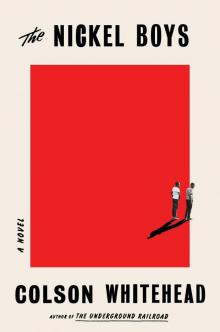 The Nickel Boys
The Nickel Boys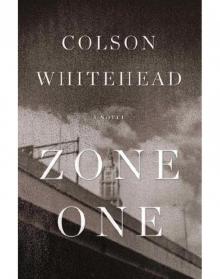 Zone One
Zone One The Underground Railroad
The Underground Railroad The Colossus of New York
The Colossus of New York The Intuitionist
The Intuitionist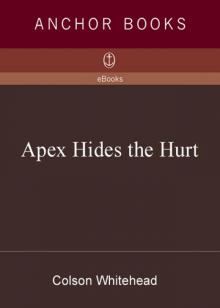 Apex Hides the Hurt
Apex Hides the Hurt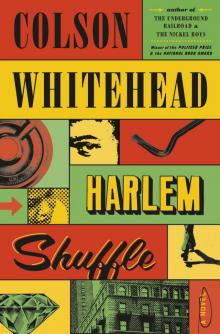 Harlem Shuffle
Harlem Shuffle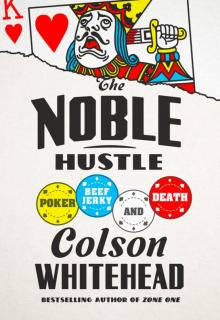 The Noble Hustle
The Noble Hustle